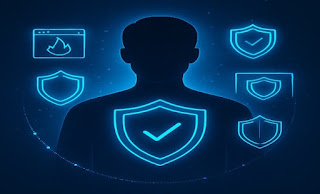Top 20 Cyber Security Tips to Stay Safe Online in 2026
🔒 Top 20 Cyber Security Tips to Stay Safe Online in 2026
In our increasingly digital world, cyber threats have become more advanced and occur more frequently than ever. Whether you're an individual, business owner, or remote worker, practicing good cyber hygiene is no longer optional—it's essential.
This comprehensive guide will walk you through the top 20 cybersecurity tips that will help you protect your data, identity, and privacy in 2026.
🧠 Why Cyber Security Matters in 2026
Rising Cybercrime Statistics
By 2026, cybercrime is expected to cost the world $10.5 trillion each year, according to Cybersecurity Ventures. From ransomware attacks to phishing scams, everyone is a potential target.
Impact on Individuals and Businesses
Cyberattacks can lead to:
- Identity theft
- Financial losses
- Damaged reputation
- Legal consequences
Staying informed and taking proactive measures is the most effective form of defense.
🔐 Top 20 Cyber Security Tips for 2026
1. Use Strong and Unique Passwords
Steer clear of weak passwords like '123456' or 'password.' Instead, create strong passwords using a mix of uppercase and lowercase letters, numbers, and special characters.
Pro tip: Use a password manager like LastPass or 1Password.
2. Enable Two-Factor Authentication (2FA)
Always enable 2FA for your email, banking, and social accounts. It enhances system defenses by introducing a secondary authentication barrier.
3. Install Antivirus and Anti-Malware Software
Use reputable security software to detect and block threats in real-time. Keep it updated.
4. Keep Software and Devices Updated
Outdated apps and operating systems are easy targets. Keep your software safe—just activate auto-updates and forget the rest!
5. Avoid Public Wi-Fi Without a VPN
Public Wi-Fi is a hacker’s playground. Employ a virtual private network (VPN) to ensure your internet connection is securely encrypted.
6. Beware of Phishing Emails
Look out for suspicious links, fake email addresses, or urgent requests for personal info. Always verify before clicking.
7. Secure Your Home Wi-Fi Network
Change default router passwords and enable WPA3 encryption. Also, hide your network SSID if possible.
8. Back Up Your Data Regularly
Use both cloud and external backups to ensure your data isn’t lost during an attack.
9. Log Out of Accounts When Not in Use
Especially on shared or public devices. Staying logged in increases vulnerability.
10. Use Encrypted Messaging Apps
Use apps like Signal or WhatsApp for private communication.
11. Limit Personal Information Shared Online
Don’t overshare your location, vacation plans, or financial info on social media.
12. Disable Bluetooth When Not in Use
Bluetooth can be exploited by cybercriminals. Disable it when not needed.
13. Review App Permissions
Only give apps the permissions they truly need. Avoid apps that request unnecessary access.
14. Set Up Biometric Security
Use fingerprint or facial recognition for added protection on mobile devices.
15. Use Secure Browsers
Browsers like Brave or Firefox offer better privacy features than Chrome.
16. Educate Yourself and Family Members
Make sure everyone in your home knows the basics of cyber safety—especially kids and elders.
17. Enable Account Activity Alerts
Many apps and websites offer login alerts. Turn them on to get notified of unauthorized access.
18. Shred Sensitive Documents
Before disposing of paper records with personal or financial info, shred them.
19. Check for HTTPS
Always look for "https:" before entering sensitive information on websites.
20. Practice Safe Downloading
Only download files or software from trusted sources. Beware of pirated or cracked content.
🛡️ Cyber Security for Businesses
Conduct Regular Security Audits
Schedule internal audits to identify weaknesses and ensure compliance with regulations.
Train Employees on Cyber Awareness
Employees are the first line of defense. Regular workshops can reduce human error.
Implement a BYOD Policy
Ensure that any personal devices used by employees comply with your organization’s security standards.
Use Endpoint Protection
Every device that connects to your network should be protected against threats.
📲 Mobile Cyber Security Tips
- Use screen locks
- Don’t root or jailbreak your device
- Avoid third-party app stores
- Make sure ‘Find My Device’ is enabled so you can track your device if it goes missing.
- Regularly examine data usage reports to identify any unusual or suspicious activities.
🧩 Emerging Threats in 2026
Deepfakes and AI-Driven Scams
Cybercriminals are now using AI to create realistic videos, voices, and scams.
IoT Vulnerabilities
Smart home devices like security cameras, thermostats, and smart TVs can be hacked if not properly secured.
✅ Final Thoughts
Cybersecurity is an ongoing process—not a one-time setup. By following these 20 tips, you’ll significantly reduce your risk and create a safer digital environment for yourself and others.
📢 Stay Safe, Stay Smart!
Want more expert tips on digital safety, tech trends, and online privacy?
🔔 Join our newsletter and be the first to receive important updates.
🧠 Knowledge is your best firewall. Use it wisely!
❓ Frequently Asked Questions (FAQ)
Q1. What is the most important cybersecurity tip for beginners?
A: The most effective initial measures include using strong, unique passwords and activating two-factor authentication.
Q2. How often should I update my passwords?
A: Every 3–6 months. Also, change immediately if you suspect a breach.
Q3. Are free antivirus programs effective?
A: Some free versions offer basic protection, but paid software provides more comprehensive security features.



No comments